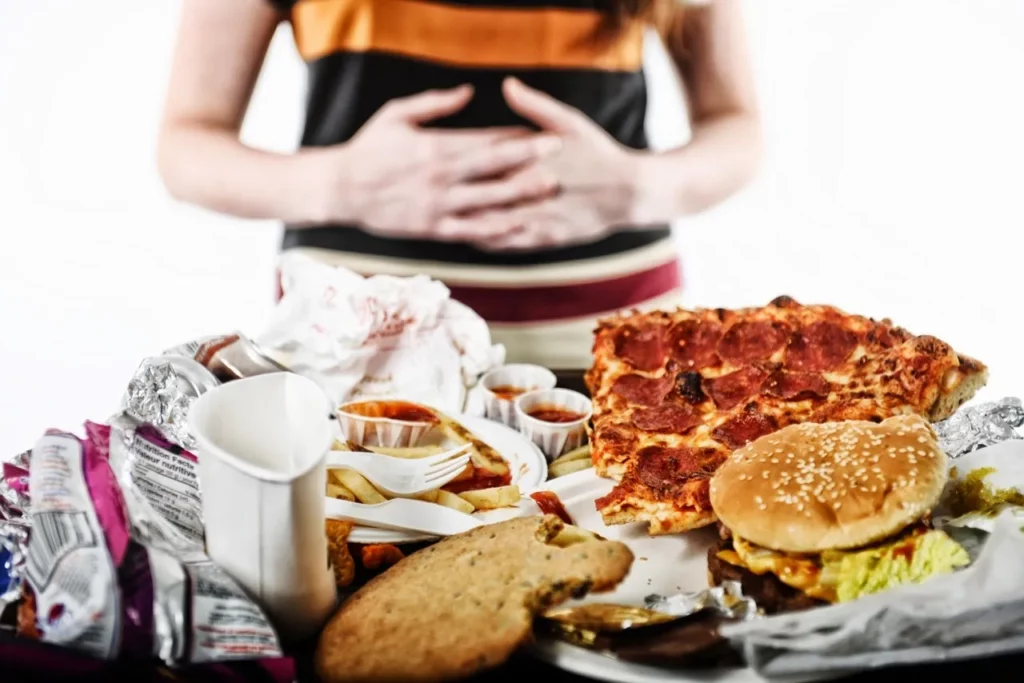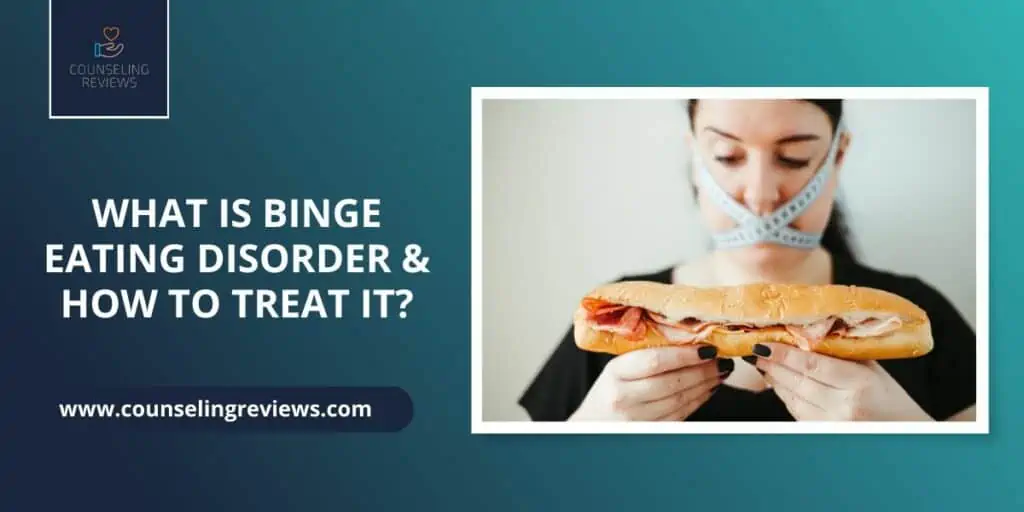Everyone knows what it feels like to binge on a cake or on mouth-watering slices of freshly baked pizza. But when does binging become a problem or a serious disorder that warrants intervention?
Binge eating disorder (BED) is a severe mental health condition that had been historically neglected until recently.
Albert Stunkard introduced the idea of binge eating back in the 1950s. However, it was only in 1994 that the Diagnostic and Statistical Manual of Mental Disorders-IV (DSM-4) listed binging as one of the many features of eating disorders.
Binge eating disorder was finally recognized as an official diagnosis when the DSM-5 was published in 2013.
This article helps you understand what binge eating disorder is and what you can do to seek help.
What is the Difference between Binge Eating Disorder and Other Eating disorders?
The most common eating disorders are anorexia nervosa, bulimia nervosa (also known as bulimia), and binge eating disorder.
People who suffer from anorexia nervosa have a distorted body image and tend to eat very little to avoid gaining fat. They go to extreme lengths to avoid putting on weight, even when they weigh significantly less than their ideal weight.
People with anorexia may refuse to eat enough, count the calories they consume, and engage in more fitness activities than necessary. They may occasionally engage in purging behaviors such as using laxatives or inducing vomiting.
The consequences of anorexia nervosa can be devastating. It can cause severe constipation, anemia, and even potentially fatal conditions.
People with bulimia nervosa often appear healthy as they binge-eat frequently and engage in compensatory behaviors such as purging and taking laxatives.
The defining feature of bulimia is that unlike those who suffer from anorexia, people with bulimia nervosa consume a lot of food quickly, and purge soon after.
Bulimia can lead to several physical complications such as kidney issues, chronic sore throat due to forced vomiting, intestinal problems due to overuse of laxatives, etc.
Binge eating disorder differs from the above-mentioned eating disorders in two critical ways. A person diagnosed with binge eating disorder does not engage in compensatory behaviors such as inducing vomiting or taking laxatives.
And in contrast to anorexia nervosa, people with binge eating disorder consume excessive amounts of food, leading to obesity and other health issues.
All the three eating disorders are serious mental health conditions with catastrophic medical consequences.
Who is at Risk for Binge Eating Disorder?
According to recent estimates, 1.6% of women and 0.8% of men suffer from binge eating disorders. In addition, teenagers may exhibit symptoms of this disorder as well. Among women, binge eating disorder is more prevalent during early adulthood.
In contrast, men seem to experience symptoms of BED during middle age. Clearly, adults and adolescents are at risk of developing binge eating disorders, regardless of gender.
What Causes Binge Eating Disorder?
Eating disorders are often associated with beliefs about slimness and physical attractiveness. Beauty ideals vary across cultures and depend on several factors, such as geography, history, and socioeconomic factors.
In most modern societies, including the US, an athletic and taut body is considered attractive. Although there have been discussions about plumpness being considered attractive and desirable in some societies, eating disorders are found almost everywhere today. Unfortunately, there is more to eating disorders than what most people believe.

An article in the Psychiatric Times correctly states that factors other than body image may play a role in the development of eating disorders.
Ideas about nutrition and health, religious beliefs such as spiritual purity, and perceived social roles can all affect our beliefs about food.
In addition, problems with impulse control, mood disorders, and other psychological difficulties can influence our eating habits.
Other risk factors include a family history of eating disorders, inherited genes, and a tendency to diet. Hence, eating disorders, including binge eating disorders, may develop due to multiple reasons. Nobody is particularly immune from developing one.
What are the Symptoms of Binge Eating Disorder?
Here are the typical symptoms of binge eating disorder:
- You repeatedly have binge-eating episodes.
- Your binge-eating episodes match three or more of the following criteria.
- You eat more quickly than others
- You eat until it feels very uncomfortable
- You consume food even when you have no physical sensations of hunger
- You eat alone because you are embarrassed by the amount of food you consume
- After an episode of overeating, you feel depressed, guilty, or disgusted with yourself
- You feel distressed about your binge-eating episodes
- You do not engage in compensatory behaviors seen in other disorders such as bulimia. This means you do not induce vomiting nor take laxatives to “get rid of” the food you’ve eaten.
How is Binge Eating Disorder Diagnosed?
Binge eating disorder is a complex medical and psychiatric condition that requires several tests and examinations. Often, it is necessary to consult multiple specialists such as psychiatrists, clinical psychologists, general physicians, endocrinologists, dieticians, etc.
Physical Exam: First and foremost, it is essential to rule out serious medical conditions. Your general physician may check your weight and calculate your body mass index (BMI).
They may also check your blood pressure, glucose levels, and the condition of your skin, hair, and nails and listen to your heart and lungs with the help of a stethoscope.
Your GP may also examine your abdominal area to rule out suspicious signs and symptoms. After the primary physical exam, they may request lab tests.
Lab tests: As eating disorders generally affect most organs in our body, a thorough investigation is often necessary.
Your doctor may request a complete blood count test, tests that evaluate your kidneys and liver’s functioning, and other specialized tests as may be required.
They may also request a urinalysis, which helps detect abnormalities such as high levels of proteins, glucose, and uric acid.
Advanced medical tests: Blood tests alone cannot detect the damage done by binge eating disorder.
Hence, conducting X-rays and electrocardiograms (ECGs) is necessary to evaluate your bone and heart health.
Psychological evaluation: Emotional disturbance and maladaptive coping mechanisms are central to the development of eating disorders. Binge eating disorder is also related to problems with impulse control, shame, and guilt. Hence, a complete psychological evaluation is often necessary.
Clinical psychologists may ask you to fill in certain questionnaires and allow you to speak at length to understand how you developed a binge eating disorder.
During the initial session, your therapist may inquire about your interpersonal relationships, your childhood experiences, events and situations that maintain your eating disorder, and other questions as may be necessary.
This process is known as “case history taking.” Once the clinical psychologist or therapist diagnoses you with a binge eating disorder, they may refer you to a psychiatrist while advising you to return for regular therapy sessions.

How is Binge Eating Disorder Treated?
Although BED is a serious psychiatric illness with physical and medical consequences, there are evidence-based treatments to address it. Mental health professionals commonly treat binge eating disorders with medicines and psychotherapy.
Medications are prescribed by psychiatrists, while clinical psychologists most commonly offer psychotherapy.
Binge eating disorder is treated with antidepressants, anticonvulsants, and other medicines as may be necessary depending on your physical condition. As binging on food has several medical consequences, it is also essential to work with a general physician.
Some of the common physical consequences of binge eating disorder are obesity, cardiovascular disorders, hypertension, diabetes, etc.
Social workers, psychiatric nurses, and rehabilitation professionals may offer psychotherapy in some countries. Please make sure that you seek therapy for your eating disorder from a mental health professional who is licensed by a regulatory authority in your jurisdiction.
Cognitive behavior therapy is an evidence-based form of psychotherapy for all eating disorders, including binge eating disorder.

Binge Eating Disorder - Frequently Asked Questions
Binge eating disorder puts you at risk of a long labor time, which results in birth-related complications. There are also risks of giving birth to premature babies or babies with congenital disabilities.
In the worst-case scenario, binge eating disorder may put you at risk of having a miscarriage.
Pregnant women with binge eating disorder need additional support to help the fetus remain healthy.
Ensuring that you work with a multi-disciplinary team of medical and mental health professionals during and after your pregnancy is essential for your and your baby’s safety and health.
It depends. A multi-disciplinary team treats people with binge eating disorder due to the complex nature of its presentation.
As a result, your medicines will depend on the particular health issues you may have developed due to binge eating disorder. Speak with your physician to clarify your doubts.
People who binge either suffer from bulimia nervosa or binge eating disorder. Binge eating disorder is characterized by the lack of compensatory behaviors such as purging (vomiting and taking laxatives), and dieting.
Both men and women are likely to have eating disorders. Among men, eating disorders may be underdiagnosed. In addition, adolescents may develop eating disorders as well.
Seeking psychotherapy can help you stop obsessing over food by learning how to manage your impulses and dysfunctional thought processes.
However, if you have an eating disorder, you must work closely with a multi-disciplinary team that includes physicians and specialists.
Support links
- Mayo Clinic – A concise article that discusses the causes, treatments, and prognosis of binge eating disorder
- ANAD (National Association of Anorexia Nervosa and Associated Disorders) – A helpful resource for finding support groups.
- WebMD – An easy-to-understand resource about binge eating disorder
- KidsHealth – Understand binge eating disorder among kids, for parents.
- Ohio University – Describes how to find help for eating disorders in general





